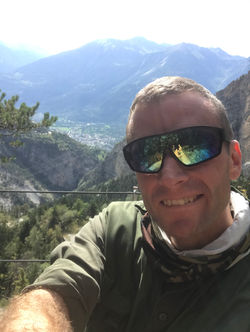
Meet the Author
Hello, and welcome to the page which is all about yours truly. Perhaps you're wondering what sort of person comes up with stories about exquisite, musical instruments getting lost on glaciers in the Swiss Alps and then brought back to their owners in the UK through a combination of paragliding and snake-charming. As Jessica says of herself in Chapter 4, "Everyone probably thinks I'm a pot dealer now."
Please be assured that such is not the case and if you do want to buy illegal substances, then I'm afraid you are definitely visiting the wrong website. However, if you'd like to find out a bit more about who comes up with this sort of unusual fiction, just read on. I'm also happy to respond to any questions or comments sent in through the contact page. So long as you're not an online stalker.
You can also hear me discuss the book on World Radio Switzerland here.
 |  |  |  |
|---|---|---|---|
 |  |
You may or may not be surprised to know that I'm not an author. I say, "may or may not be" since that may well depend on your reaction if you've read the book. Either way though, I'm not an author in the sense of being someone who makes a living by putting together an entertaining, enlightening or challenging piece of writing (or whatever else floats your boat in a written form). Instead, I'm a boring administrator with two ambitions, one partly realised, one not.
To start with the unrealised one, I had a teenage ambition to become a pilot in the Royal Navy. Appreciating that being Type 1 diabetic and short-sighted in one eye might rule me out of flying Sea Harrier fighters, I was content to go for helicopters. Although highly demanding in terms of aptitude, you don't need to handle the speed-of-sound dynamic and there were more helicopter squadrons to go for. I was, therefore, a bit disappointed to be informed that in fact, under British Ministry of Defence policy, I wouldn't even get a job as a conscript toilet cleaner on board an aircraft carrier, even if a world war were to break out. While I can understand the logic a couple of decades later, I was not impressed at the time. However, I am grateful to my parents for their encouragement to go for things which were open to me and make the most of them.
Which leads on to the second ambition. Having determined that I could write English reasonably well (I think - again, if you've read the book, your opinion is your own), I found that I enjoyed creative writing. I stuck mainly with some admittedly naff, comedy scripts until I found myself with more spare time than usual for a while and wondered if it would be possible to write a book which could get published. Considering that several politicians, celebrities and footballers manage to publish their autobiographies even though probably nothing interesting happened except for five minutes during their lifetimes, how hard could it be ? Very hard, I discovered. This is mainly because if you don't have the benefit of lots of fans, you need some good material. In a decent novel, this doesn't just take creativity but a whole lot of planning, mapping, research and hard work. Despite all that, it is still a creative process and most of all, at least as far as I can see, it's fun ! So the end result was, "Of Course I Love You, I Just Don't Like You Very Much". I looked into the UK publisher market for a range of reasons. It's extensive, it's a good place for English-language books and it's globally respected. Being British may help but I'm not sure of that since I haven't tried to get a book published there without being British. That's a tough call if you only have one passport. Mirador Publishing gave me the contract and the book was published.
Fast forward a decade and a bit. I didn't stick with the authorship as energetically as I probably should have done. I'd been busy with a lot of things and had done a bit of writing. You can see my children's story and my Church Sermons on the page of Other Works. But I was getting pulled in various directions by a range of interests, including but not limited to, family (always a big deal), the Church of Scotland (it's a liberal place in case you're wondering how that squares with the dodgy humour and dubious behaviour in the novels), hiking, air museums and other bits and pieces. It was then in 2024 when I heard about how creative arts cause various chemicals to be released in your brain which are very good for you. Creative arts, I discovered, covered the spectrum from drawing, painting, sculpture and such like, through music and dancing, to creative writing. I should stress that I'm not the greatest fan of new-age therapy and sitting around in sandals which may have a novel fungus species in them, discussing my feelings and finding redemption in a packet of barbecue roast peanuts. But I was presented this information in a very scientific manner. It didn't tell me that I should or shouldn't do something. I hate being told that I "have to" watch/listen to/read something just because somebody else thought it was delightful. Just let me make my own choice. This advice, though, did just that. So I went back to writing and decided to go for it in terms of writing another book. Some eight months later, "The Clarinet on the Glacier" emerged and Mirador very kindly gave me an offer shortly after I approached them. I won't go into the experience of writing the book, as you can find it here. But the result is there for you if you'd like it.